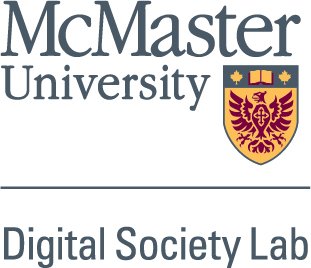
MEMBERS
Exceptional research is done by each and every CDMRN member
DisinfoWatch
DisinfoWatch is a leading Canadian foreign disinformation monitoring and debunking platform. Their data is sourced through an international network of journalists, civil society organizations and analysts, as well as some automated sources, and is analyzed and exposed in order raise broader general awareness of disinformation and build long-term resilience against it.
Their core objective is to increase public understanding and awareness about mis/disinformation, by whom and why it’s produced, how to identify it and how to help stop its spread.
Social Media Lab
The Social Media Lab is an interdisciplinary research laboratory at the Ted Rogers School of Management, Toronto Metropolitan University in Canada. The lab studies how social media is changing the ways in which people and organizations communicate, disseminate information, conduct business and form communities, and how these changes impact the social, economic and political structures of modern society. The broad aim of the lab’s various research initiatives is to advance the public’s understanding of the benefits and pitfalls of social media adoption.
Digital Democracies Institute
The Digital Democracies Institute at Simon Fraser University is a group of diverse scholars and stakeholders from around the world who collaborate across disciplines, schools, industry, and public sectors to research and create vibrant democratic technologies and cultures. They are led by Canada 150 Research Chair in New Media, Wendy Hui Kyong Chun.
They integrate research in the humanities and data sciences to address questions of equality and social justice. Their work aims to combat the proliferation of online “echo chambers,” abusive language, discriminatory algorithms and mis/disinformation, by fostering critical and creative user practices, and alternative paradigms for connection.
The Dais
The Dais (meaning ‘raised platform’) is a public policy and leadership think tank at Toronto Metropolitan University, developing the people and ideas we need to advance an inclusive, innovative economy, education system and democracy for Canada. The Dais brings together people confronting big challenges, puts research and solutions into the hands of decision-makers, and equips leaders with the knowledge and skills to act on these challenges.
Since 2015, the team has worked across Canada and internationally to develop new ideas and better leaders, resulting in measurable change in economic, education and technology policy, and thousands of people whose lives have been changed through our leadership programs.
Centre for the Study of Democratic Institutions
The Centre for the Study of Democratic Institutions (CSDI) takes an evidence-based and collaborative approach to strengthening and rethinking democracy in a digital age. CSDI advances interdisciplinary and publicly-engaged research, teaching, and dissemination of knowledge about innovation in democratic practice and institutions. We lead and participate in projects at the local (BC), national (Canada), and international levels. In doing so, we convene academics, students, civil society organizations, and publict officials to galvanize inclusive conversations and action on democracy.
CSDI’s current work focuses on two themes: health communication, and platforms and media.
Digital Society Lab
Based at McMaster University in Hamilton, Canada, the Digital Society Lab is an interdisciplinary research centre that engages through scholarship and praxis with the complex societal transformations that have accompanied the digital age. The lab endeavours to advance the study of the social, political, and economic impacts of digital technologies while also harnessing the potential of these technologies for scientific and social innovation.
The Digital Society Lab includes faculty, postdoctoral fellows, graduate and undergraduate students, as well as teaching and community partners. It is currently engaged in a diverse set of research areas, such as developing new algorithms for the detection of misinformation on social media, exploring public attitudes toward the adoption and regulation of new technologies, and critically examining how the Internet is governed.
The Chair UNESCO-Prev aims to act as a centre of excellence to develop, share and promote research and actions in the context of primary, secondary and tertiary prevention of violent radicalization and extremism. It ensures close cooperation among researchers and communities of practice in a comparative, multidisciplinary and north-south perspective. The Chair strives to enable networking, action research, capacity building and sensitization.
UNESCO-PREV
CANIS: Canadian Network on Information and Security examines the impact of the domestic and international information environments (IE) on Canadian national defence and security with a primary objective to draw novel conclusions about the IE and its use as an operational domain. CANIS is aiming to identify the best practices from domestic and international actors, and how they could be applied to the Canadian context, specific information environment, and societal composition. It is a multidisciplinary initiative spanning four faculties at the University of Calgary: Faculty of Arts, School of Public Policy, Schulich School of Engineering, and Faculty of Law
Canadian Network on Information and Security
Pol Comm Tech is an academic research group focused on exploring the intersections of politics, communication, and technology. Led by Dr. Elizabeth Dubois, the Pol Comm Tech Lab includes students and researchers from communication studies, political science, law, computer science, and more.
The Pol Comm Tech Lab conducts research in six areas:
Mean Tweets: Examines the impact of online harassment on political journalists in Canada.
Global Journalism Innovation Lab: Policy impact of explanatory journalism.
Digital Ecosystem Research Challenge: Mapping the digital ecosystem of the 2019 federal election to support increased civic and digital literacy.
Connected Canada Initiative: Unpacking what it means to be a digital citizen in Canada today.
Political Bots: Examining types of bots and their relationships with other political actors.
Search, Social Media, and Political Opinion Formation: Investigates the roles of social media, search, and personal influence in people’s political opinion formation process.
Pol Comm Tech
The First Nations University of Canada is a First Nations owned post-secondary institution that aspires to have a transformative impact by bridging our ceremonies, knowledge keepers, languages, and traditions with the delivery of high-quality education that will lead to the pride and success of all students, First Nations communities, and Canada.
The mission of the First Nations University of Canada is to enhance the quality of life and to preserve, protect and interpret the history, language, culture and artistic heritage of First Nations. The university aims to provide opportunities for quality bi-lingual and bi-cultural education under the mandate and control of the First Nations of Saskatchewan. It is a First Nations’ controlled university-college which provides educational opportunities to both First Nations and non-First Nations university students selected from a provincial, national and international base.









